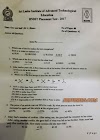Click on the tabs to see the Detailed Syllabus:
Module Details
| Module Code | HNDIT 1105 |
|---|---|
| Module Title | Database Management Systems |
| Credits | 2 |
| Hours /Week |
Lectures - 15 Lab/Tutorial - 45 |
| Semester | 1 |
| GPA/NGPA | GPA |
| Module Type | Core Compulsory |
Module Aims & Objectives
Develop fundamental skills required in planning, organizing, and storage retrieval of
information in computer systems and skills required for managing / administrating small and
mid-range database systems.
Learning Outcomes
At the end of the module the student will be able to:
▪ Describe the fundamental concepts in databases and data processing.
▪ Analyze and systematically represent relationships in data records and perform data modeling Create, populate and manage relational databases in desktop and server environments.
▪ Use query languages to populate, update and retrieve data from databases.
▪ Implement basic security in database systems Outline Syllabus.
▪ An introduction to data processing and databases Database management systems Data analysis and Data modeling (ER diagrams and conceptual modeling).
▪ Relational models and normalizations.
▪ Creating databases using GUI tools Query Languages (Standard Query language).
▪Introduction to database security
▪ Describe the fundamental concepts in databases and data processing.
▪ Analyze and systematically represent relationships in data records and perform data modeling Create, populate and manage relational databases in desktop and server environments.
▪ Use query languages to populate, update and retrieve data from databases.
▪ Implement basic security in database systems Outline Syllabus.
▪ An introduction to data processing and databases Database management systems Data analysis and Data modeling (ER diagrams and conceptual modeling).
▪ Relational models and normalizations.
▪ Creating databases using GUI tools Query Languages (Standard Query language).
▪Introduction to database security
Outline Syllabus
1. Introduction to DBMS
2. Database model& Scheme
3. Data Base Design ER model
4. Structure Query Language
5. Table normalization
6. Security concepts & introducing advanced database concepts
2. Database model& Scheme
3. Data Base Design ER model
4. Structure Query Language
5. Table normalization
6. Security concepts & introducing advanced database concepts
Assessments
| Type | Activity | Weighting |
|---|---|---|
| Continuous Assessment | Class assignments, Group activity, Team based activity and tutorials | 50% |
| Semester Examination | Final Structured Paper | 50% |
Recommended Learning Activities
Student centered teaching learning activity use to achieve each outcomes.
Resources: Equipment, Tools and Materials
Computer lab with Internet access
desktop database (such as MS Access or compatible) Server
SQL database (MSSQL Server or MySQL Server)
Management Tools
desktop database (such as MS Access or compatible) Server
SQL database (MSSQL Server or MySQL Server)
Management Tools
Prescribed Books
[2]. Balter, Teach yourself Microsoft SQL Server 2005 Express in 24 Hours, Pearson Education





0 Comments